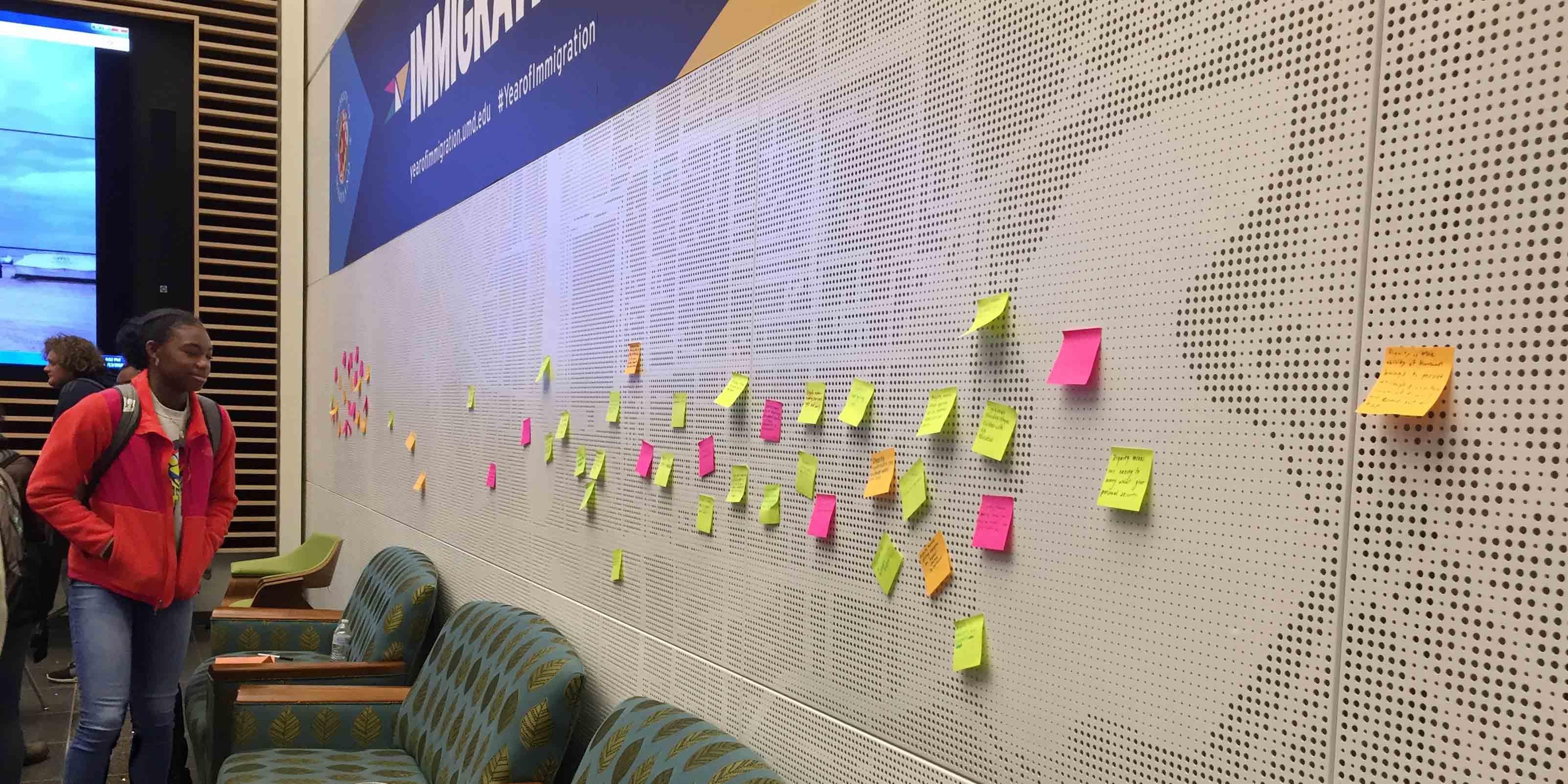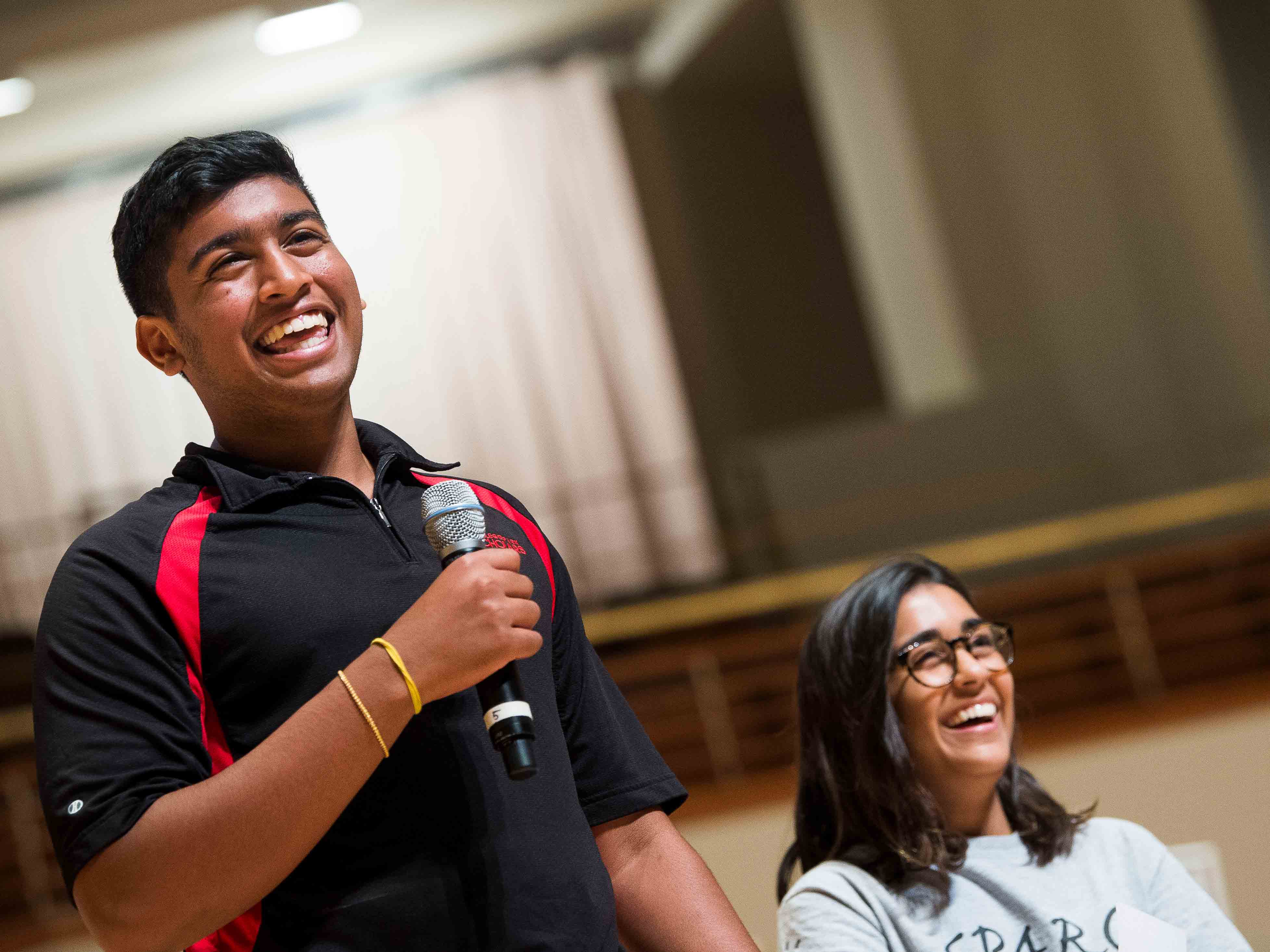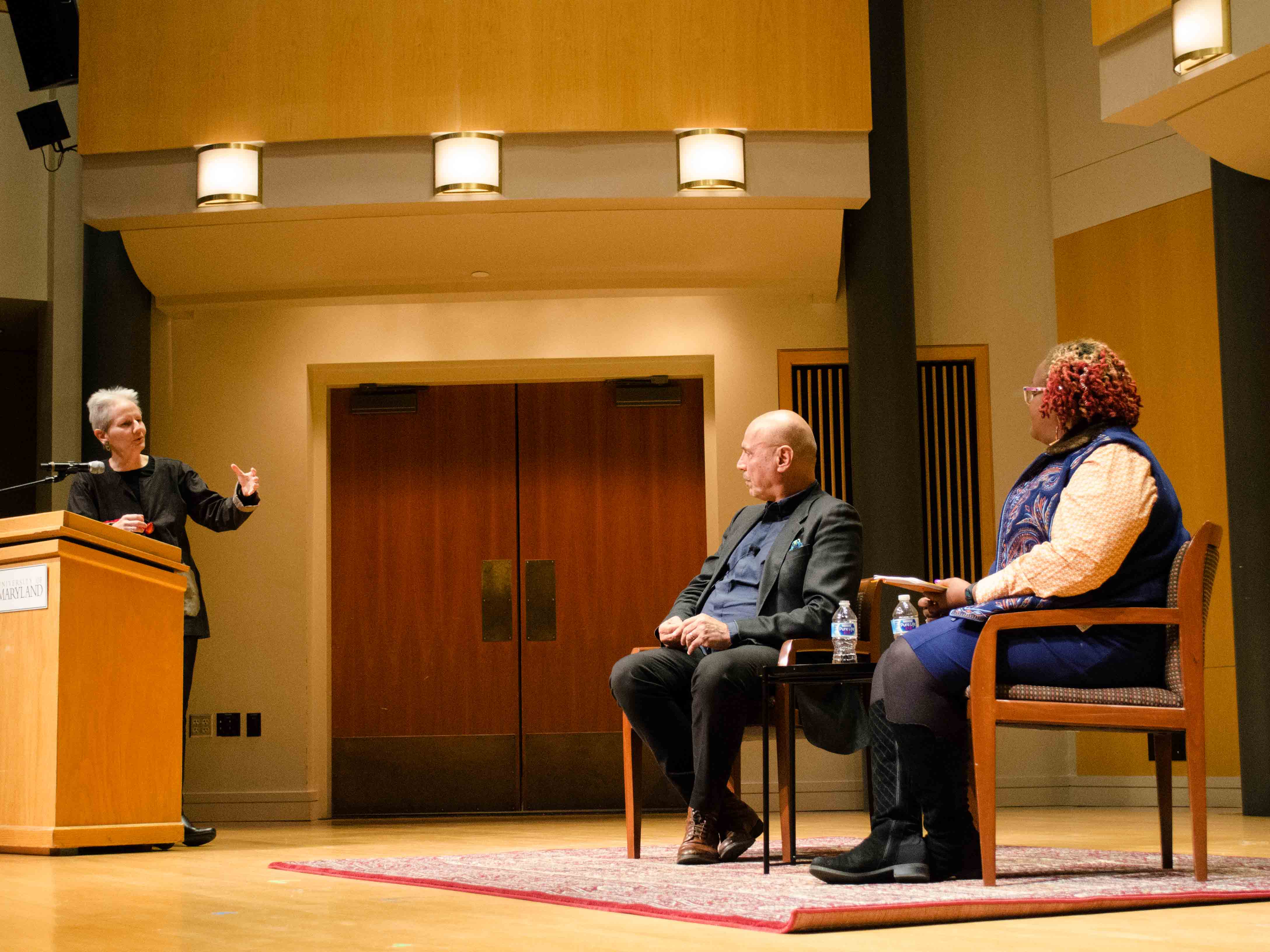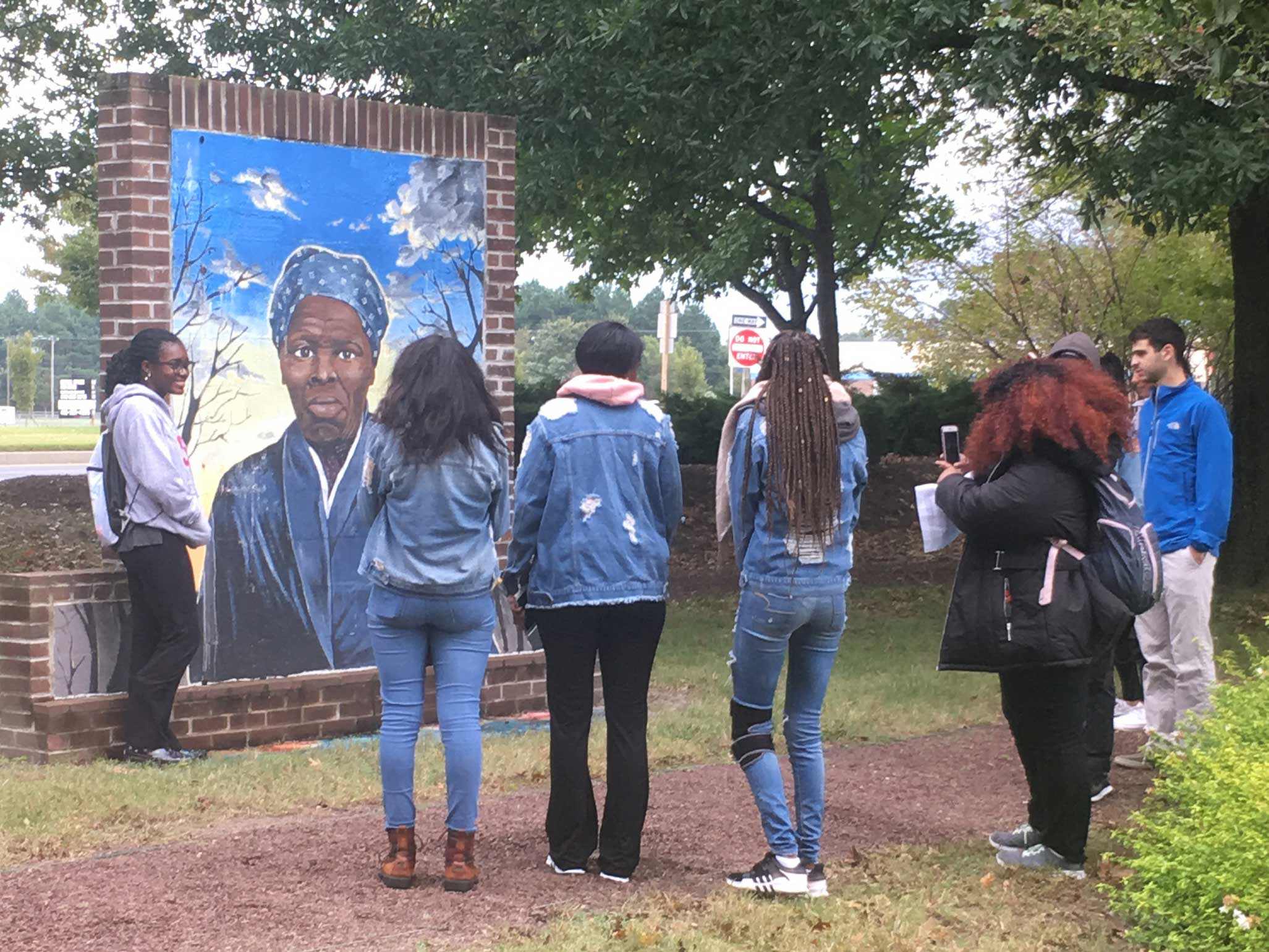
College Park Scholars has been coordinating an annual theme for four years—starting with “Trash: The Problem of Waste in Our Lives and Our World” in the fall of 2015. The annual theme gives our students, who tend to spend most of their Scholars classroom time within their individual programs, an opportunity to interact across programs.
We take on a complex, multifaceted problem, work to understand its causes and impacts, and discuss how we might address it. Because each student comes into the discussion with their unique perspectives and the perspectives they’re learning in their respective Scholars program, the annual theme affords students a larger venue in which to make interdisciplinary connections.
The Scholars theme for 2018–19 was “Migrations: Populations and Practices on the Move.” As with our previous themes, we hosted a variety of talks, films and other activities, anywhere from the Cambridge Community Center to Cambridge, Md. Because the theme was also tied to a campus-wide initiative, “Year of Immigration,” sponsored by the College of Arts and Humanities and the Office of International Affairs, students had an even wider array of options to take in throughout the year.
Here is just some of what we learned from the “Migrations” theme.
1. Sharing stories of migration, whether from across the globe or the next town over, can help people forge connections.

When five Scholars alums took the stage at Convocation (left) last September, they had a rapt audience of first-year students who were wrapping up their first week on campus. Whether the stories they shared were of their own migration from the Netherlands to Maryland for college, or that of their parents from El Salvador and the Ukraine meeting for the first time in the Soviet Union, the narratives all spoke of adjustment, challenge and opportunities to grow—opportunities that the first-year students would share for their time in Scholars.
2. Ever wondered why college students’ diets can change so much when they migrate to campus? You can thank brain chemistry (especially the hippocampus).
Our newest Scholars director, Beth Parent (Life Sciences) decided to connect to our annual theme in a way that she felt all students could relate to: Why our bodies react to new situations (such as migrating to college) the way that they do. When she broke the topics into five modules—Eat, Drink, Sleep, Stress and Relax—she found that students were able to connect to one another and reflect on the ways they changed by the end of the semester.
And yes, we crave high-fat and -sugar foods because they were scarce for our ancestors. And, not surprisingly, in modern times, our fight-or-flight response is overused in new ways.
Oh, it also turns out that “sleep really is important, and there are impacts on your body and brain when you don’t get enough,” according to Parent. It’s an important lesson for our new students (and perhaps faculty!) to recognize as they build new habits.
3. Climate change and immigration issues are deeply linked—and they will be increasing in coming years.
Though it’s unsurprising that a program like Science and Global Change would look at the issue of climate change, Director Tom Holtz used the film, “Climate Refugees,” to help students make connections beyond the physical effects on the environment. “Climate change produces environmental disruptions, which results in food and water insecurity, which can exacerbate social unrest,” Holtz wrote in his post-screening blog post. “Such unrest is a major cause of people leaving their homelands and seeking security in other parts of the world.”
While he observed that the topics raised in the documentary are not easy or pleasant to discuss, Holtz said the students were able to consider new perspectives on the ways in which even these larger issues can be addressed with small steps.
4. When it comes to stories of migration, food is at the heart of connection for students...
Food was often a crucial component of our theme events this year, from the Vietnamese bánh mì sandwiches that accompanied a discussion of the university’s First Year Book, “The Refugees,” to the stories of how a taste of homemade tortillas brought back memories of cooking with a beloved grandparent.
Take Justice and Legal Thought Scholars alum Andrew (Drew) Tawiah, one of the student presenters at Convocation. He noted, “Growing up in a Ghanaian household, there were frequent family gatherings that involved Ghanaian food options such as rice, stew and plantains. To this day, if I want to make a simple meal, I make rice and stew—I taught myself how during my junior year, but...sometimes I still miss it because I don’t cook as well as my mom does.”
5. ...It also played a crucial role in the development of local Iraqi-American restaurateur, entrepreneur, artist, political activist and politician Andy Shallal.

Prior to our marquee theme event, “MIGRATIONS: Conversations on food, art and cultural fusion,” Shallal was asked why he turned to a career in the restaurant business after leaving the National Institutes of Health. He answered: “I decided to wait tables, because that’s what you do when you need cash: You do what you have to do.”
But Shallal (pictured at right with Scholars Executive Director Marilee Lindemann and event moderator Psyche Williams-Forson) soon discovered that he loved how the food he served as a waiter made people happy. “Food is very, very important—it’s a great way to connect with different types of people,” he shared.
It was Shallal’s time waiting tables that led him to found local restaurant chain Busboys and Poets, where people can come together to share a meal, enjoy performances and, he hopes, unite across difference.
6. There is a direct correlation between migration and health, and refugees’ stories bring this issue to the forefront.
Much like Dr. Holtz with “Climate Refugees,” Global Public Health Scholars Director Lis Maring facilitated a film screening of the documentary, “Salam Neighbor.” This film was screened outside of our community, in H.J. Patterson Hall, in partnership with the Year of Immigration. The open atrium setting brought in an audience of more than 70 Scholars students.
The documentary follows the lives of Syrian refugees in a refugee camp, highlighting what Maring describes as critical public health topics such as dignity, education, trauma and disease. Students also were able to get a greater understanding of the human side of a crisis they may only have heard about on the news.
After the film, students had an opportunity to reflect and finish the sentence, “Dignity means...” on a sticky note (see main photo, above). As Dr. Maring noted in her blog, these responses ranged from “Dignity means being able to thrive and grow, not just survive,” and “Dignity is feeling like you can contribute to your community.”
7. When trying to reconstruct a narrative about forced migration, sometimes the absence of artifacts can lead to deeper discussions.

Students who attended our first theme excursion to the Harriet Tubman Byway in October came together from across programs to explore the Eastern Shore and learn more about the difficult history of slavery in Maryland (left). For many, it was their first chance to explore the part of Maryland that gives our residence hall community its name (Cambridge). They also got a chance to learn more about a figure many of them had not discussed since grade school.
Along the way were literal and figurative twists and turns as sites we expected to visit turned out not to exist or activities turned out to be geared toward a much younger audience.
But the absence of organized activities and physical markers, rather than being a negative, became a positive experience: Students were able to sit and reflect together, to think about the ways in which their own histories had been shaped and to consider how to make meaning of something when our physical evidence is gone.
8. Dialogue around migration can feel challenging, but tripping up and learning is part of the process.
Throughout the year, students and faculty were asked to engage with topics that can be, and often were, emotionally and intellectually fraught: ideas about migration, immigration policy and more. The conversations were difficult at times, as students considered the ways in which their own experiences were perhaps less universal than they might have believed prior to coming to the university.
But as Andy Shallal noted during the Q&A portion of our marquee event, that stumbling and awkwardness is a crucial component to learning how to do better. “For years,” he said, “people thought if we forget long enough, [racial issues] would just go away. [But] when you sweep things under the carpet, they get lumpy, and you trip over them.”
Confronting difficulties and difference requires nuance, as well as a willingness to be vulnerable and to make mistakes from which you’re willing to learn.
“All our identities have messages to share, once people hear each other’s stories. Once you have that, [people] start to connect with one another and learn something about themselves,” Shallal said.